Psychosocial Development Across Life Span: Theories of Freud & Erikson
VerifiedAdded on 2022/08/15
|6
|1035
|14
Essay
AI Summary
This essay delves into the realm of psychosocial development, focusing on the theories of Sigmund Freud and Erik Erikson. It begins with an introduction to developmental psychology, highlighting its significance in understanding human behavior and change across the lifespan. The essay then examines Freud's psychoanalytic theory, discussing his concepts of the id, ego, and superego, and his emphasis on the impact of childhood experiences on adult personality. It also addresses the strengths and weaknesses of Freud's theory. Following this, the essay explores Erikson's psychosocial theory, which outlines eight developmental stages from infancy to adulthood, emphasizing the role of social experiences in shaping personality. It details the stages, such as trust vs. mistrust and identity vs. confusion, and also discusses the strengths and criticisms of Erikson's theory. The essay concludes by synthesizing the two theories, emphasizing the importance of past experiences and social interactions in shaping psychological development. The references used for the essay are also provided.
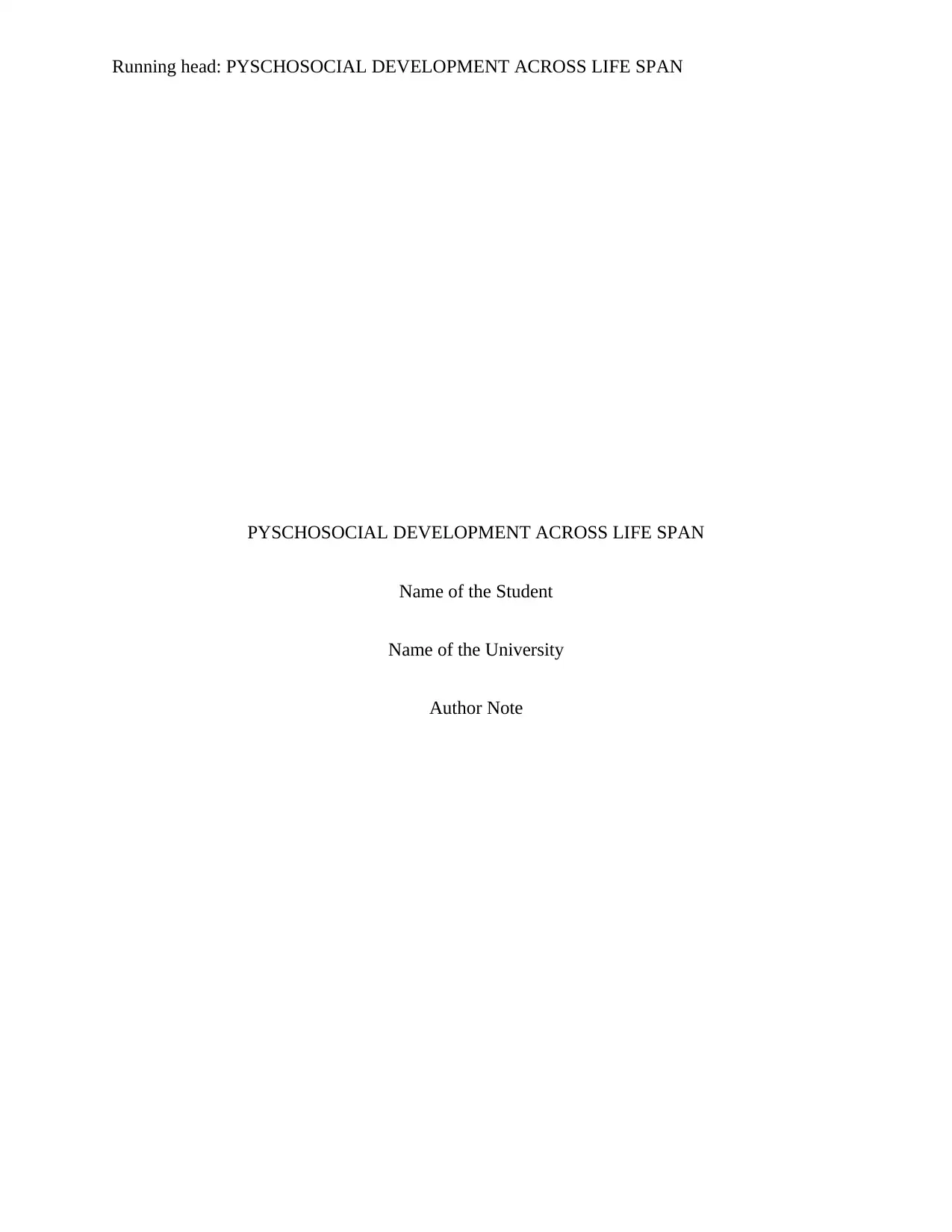
Running head: PYSCHOSOCIAL DEVELOPMENT ACROSS LIFE SPAN
PYSCHOSOCIAL DEVELOPMENT ACROSS LIFE SPAN
Name of the Student
Name of the University
Author Note
PYSCHOSOCIAL DEVELOPMENT ACROSS LIFE SPAN
Name of the Student
Name of the University
Author Note
Paraphrase This Document
Need a fresh take? Get an instant paraphrase of this document with our AI Paraphraser
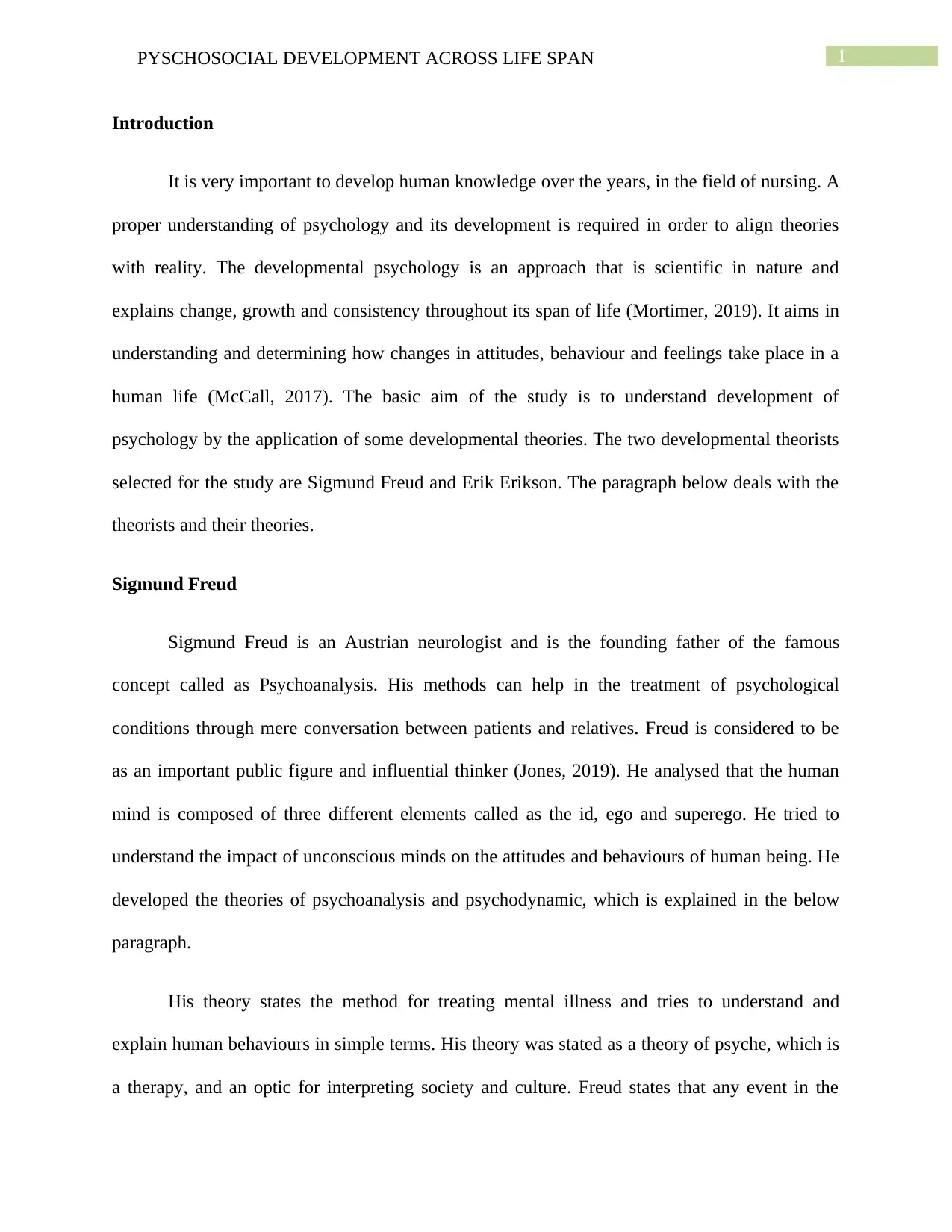
1PYSCHOSOCIAL DEVELOPMENT ACROSS LIFE SPAN
Introduction
It is very important to develop human knowledge over the years, in the field of nursing. A
proper understanding of psychology and its development is required in order to align theories
with reality. The developmental psychology is an approach that is scientific in nature and
explains change, growth and consistency throughout its span of life (Mortimer, 2019). It aims in
understanding and determining how changes in attitudes, behaviour and feelings take place in a
human life (McCall, 2017). The basic aim of the study is to understand development of
psychology by the application of some developmental theories. The two developmental theorists
selected for the study are Sigmund Freud and Erik Erikson. The paragraph below deals with the
theorists and their theories.
Sigmund Freud
Sigmund Freud is an Austrian neurologist and is the founding father of the famous
concept called as Psychoanalysis. His methods can help in the treatment of psychological
conditions through mere conversation between patients and relatives. Freud is considered to be
as an important public figure and influential thinker (Jones, 2019). He analysed that the human
mind is composed of three different elements called as the id, ego and superego. He tried to
understand the impact of unconscious minds on the attitudes and behaviours of human being. He
developed the theories of psychoanalysis and psychodynamic, which is explained in the below
paragraph.
His theory states the method for treating mental illness and tries to understand and
explain human behaviours in simple terms. His theory was stated as a theory of psyche, which is
a therapy, and an optic for interpreting society and culture. Freud states that any event in the
Introduction
It is very important to develop human knowledge over the years, in the field of nursing. A
proper understanding of psychology and its development is required in order to align theories
with reality. The developmental psychology is an approach that is scientific in nature and
explains change, growth and consistency throughout its span of life (Mortimer, 2019). It aims in
understanding and determining how changes in attitudes, behaviour and feelings take place in a
human life (McCall, 2017). The basic aim of the study is to understand development of
psychology by the application of some developmental theories. The two developmental theorists
selected for the study are Sigmund Freud and Erik Erikson. The paragraph below deals with the
theorists and their theories.
Sigmund Freud
Sigmund Freud is an Austrian neurologist and is the founding father of the famous
concept called as Psychoanalysis. His methods can help in the treatment of psychological
conditions through mere conversation between patients and relatives. Freud is considered to be
as an important public figure and influential thinker (Jones, 2019). He analysed that the human
mind is composed of three different elements called as the id, ego and superego. He tried to
understand the impact of unconscious minds on the attitudes and behaviours of human being. He
developed the theories of psychoanalysis and psychodynamic, which is explained in the below
paragraph.
His theory states the method for treating mental illness and tries to understand and
explain human behaviours in simple terms. His theory was stated as a theory of psyche, which is
a therapy, and an optic for interpreting society and culture. Freud states that any event in the
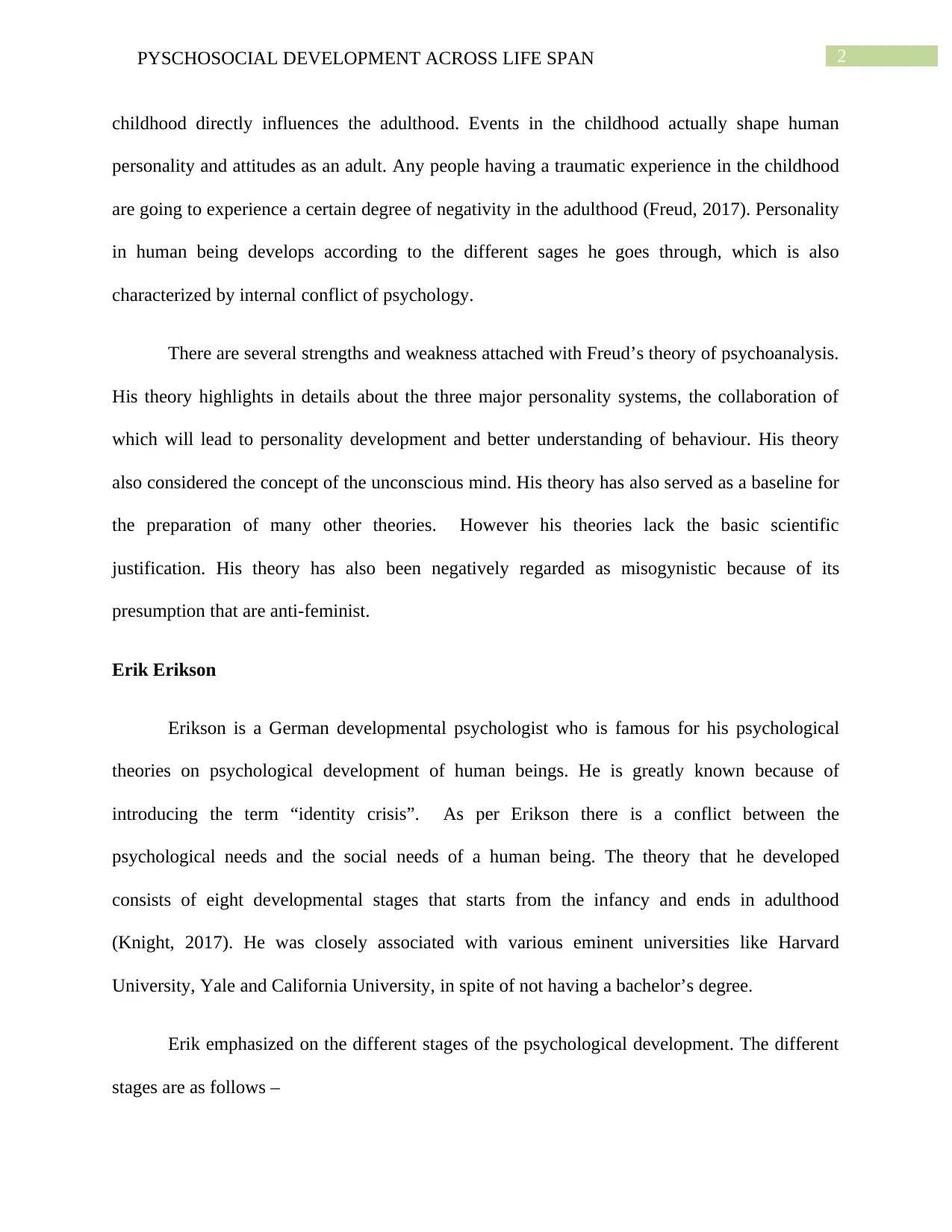
2PYSCHOSOCIAL DEVELOPMENT ACROSS LIFE SPAN
childhood directly influences the adulthood. Events in the childhood actually shape human
personality and attitudes as an adult. Any people having a traumatic experience in the childhood
are going to experience a certain degree of negativity in the adulthood (Freud, 2017). Personality
in human being develops according to the different sages he goes through, which is also
characterized by internal conflict of psychology.
There are several strengths and weakness attached with Freud’s theory of psychoanalysis.
His theory highlights in details about the three major personality systems, the collaboration of
which will lead to personality development and better understanding of behaviour. His theory
also considered the concept of the unconscious mind. His theory has also served as a baseline for
the preparation of many other theories. However his theories lack the basic scientific
justification. His theory has also been negatively regarded as misogynistic because of its
presumption that are anti-feminist.
Erik Erikson
Erikson is a German developmental psychologist who is famous for his psychological
theories on psychological development of human beings. He is greatly known because of
introducing the term “identity crisis”. As per Erikson there is a conflict between the
psychological needs and the social needs of a human being. The theory that he developed
consists of eight developmental stages that starts from the infancy and ends in adulthood
(Knight, 2017). He was closely associated with various eminent universities like Harvard
University, Yale and California University, in spite of not having a bachelor’s degree.
Erik emphasized on the different stages of the psychological development. The different
stages are as follows –
childhood directly influences the adulthood. Events in the childhood actually shape human
personality and attitudes as an adult. Any people having a traumatic experience in the childhood
are going to experience a certain degree of negativity in the adulthood (Freud, 2017). Personality
in human being develops according to the different sages he goes through, which is also
characterized by internal conflict of psychology.
There are several strengths and weakness attached with Freud’s theory of psychoanalysis.
His theory highlights in details about the three major personality systems, the collaboration of
which will lead to personality development and better understanding of behaviour. His theory
also considered the concept of the unconscious mind. His theory has also served as a baseline for
the preparation of many other theories. However his theories lack the basic scientific
justification. His theory has also been negatively regarded as misogynistic because of its
presumption that are anti-feminist.
Erik Erikson
Erikson is a German developmental psychologist who is famous for his psychological
theories on psychological development of human beings. He is greatly known because of
introducing the term “identity crisis”. As per Erikson there is a conflict between the
psychological needs and the social needs of a human being. The theory that he developed
consists of eight developmental stages that starts from the infancy and ends in adulthood
(Knight, 2017). He was closely associated with various eminent universities like Harvard
University, Yale and California University, in spite of not having a bachelor’s degree.
Erik emphasized on the different stages of the psychological development. The different
stages are as follows –
⊘ This is a preview!⊘
Do you want full access?
Subscribe today to unlock all pages.

Trusted by 1+ million students worldwide
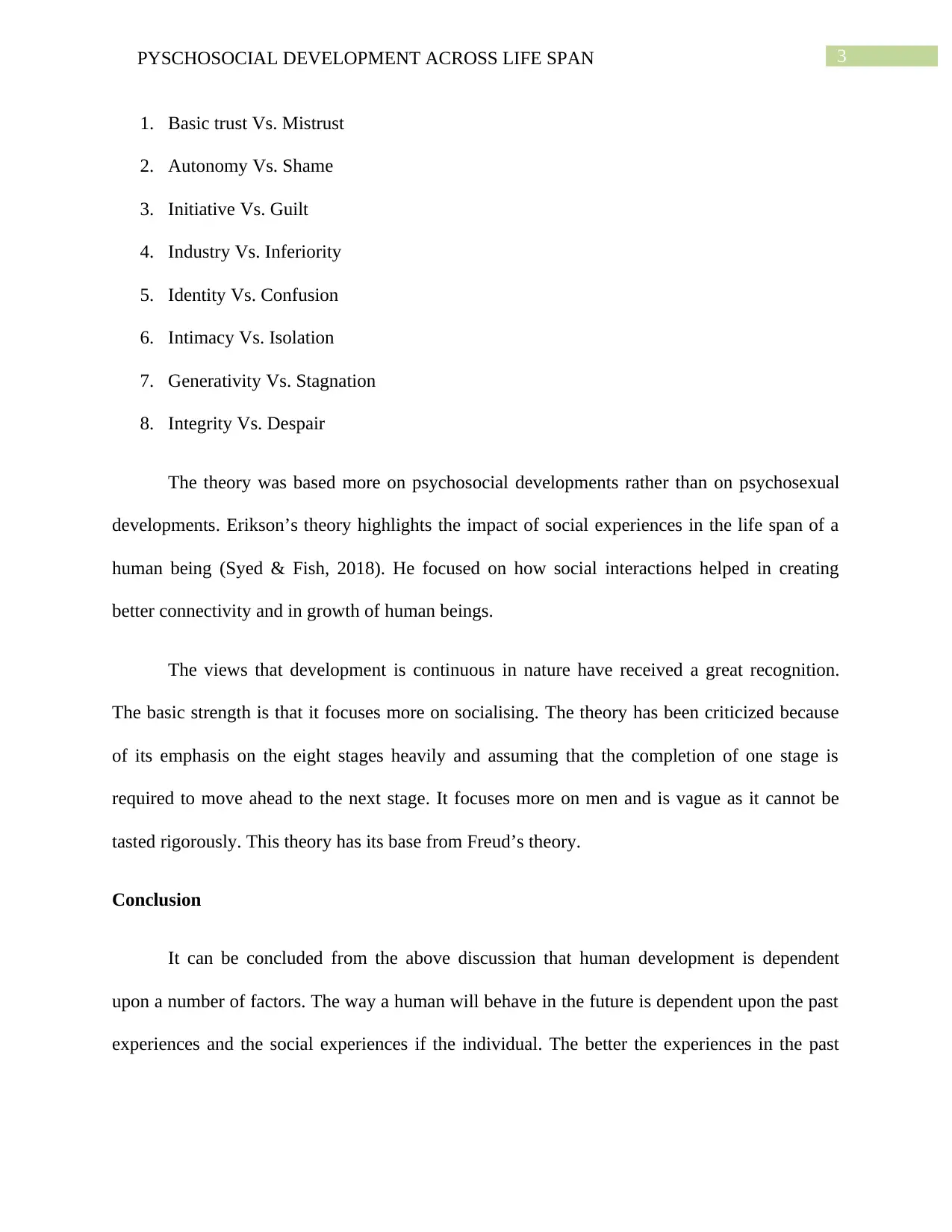
3PYSCHOSOCIAL DEVELOPMENT ACROSS LIFE SPAN
1. Basic trust Vs. Mistrust
2. Autonomy Vs. Shame
3. Initiative Vs. Guilt
4. Industry Vs. Inferiority
5. Identity Vs. Confusion
6. Intimacy Vs. Isolation
7. Generativity Vs. Stagnation
8. Integrity Vs. Despair
The theory was based more on psychosocial developments rather than on psychosexual
developments. Erikson’s theory highlights the impact of social experiences in the life span of a
human being (Syed & Fish, 2018). He focused on how social interactions helped in creating
better connectivity and in growth of human beings.
The views that development is continuous in nature have received a great recognition.
The basic strength is that it focuses more on socialising. The theory has been criticized because
of its emphasis on the eight stages heavily and assuming that the completion of one stage is
required to move ahead to the next stage. It focuses more on men and is vague as it cannot be
tasted rigorously. This theory has its base from Freud’s theory.
Conclusion
It can be concluded from the above discussion that human development is dependent
upon a number of factors. The way a human will behave in the future is dependent upon the past
experiences and the social experiences if the individual. The better the experiences in the past
1. Basic trust Vs. Mistrust
2. Autonomy Vs. Shame
3. Initiative Vs. Guilt
4. Industry Vs. Inferiority
5. Identity Vs. Confusion
6. Intimacy Vs. Isolation
7. Generativity Vs. Stagnation
8. Integrity Vs. Despair
The theory was based more on psychosocial developments rather than on psychosexual
developments. Erikson’s theory highlights the impact of social experiences in the life span of a
human being (Syed & Fish, 2018). He focused on how social interactions helped in creating
better connectivity and in growth of human beings.
The views that development is continuous in nature have received a great recognition.
The basic strength is that it focuses more on socialising. The theory has been criticized because
of its emphasis on the eight stages heavily and assuming that the completion of one stage is
required to move ahead to the next stage. It focuses more on men and is vague as it cannot be
tasted rigorously. This theory has its base from Freud’s theory.
Conclusion
It can be concluded from the above discussion that human development is dependent
upon a number of factors. The way a human will behave in the future is dependent upon the past
experiences and the social experiences if the individual. The better the experiences in the past
Paraphrase This Document
Need a fresh take? Get an instant paraphrase of this document with our AI Paraphraser

4PYSCHOSOCIAL DEVELOPMENT ACROSS LIFE SPAN
and the stringer the social interaction, the better will be the psychological development of human
being.
and the stringer the social interaction, the better will be the psychological development of human
being.
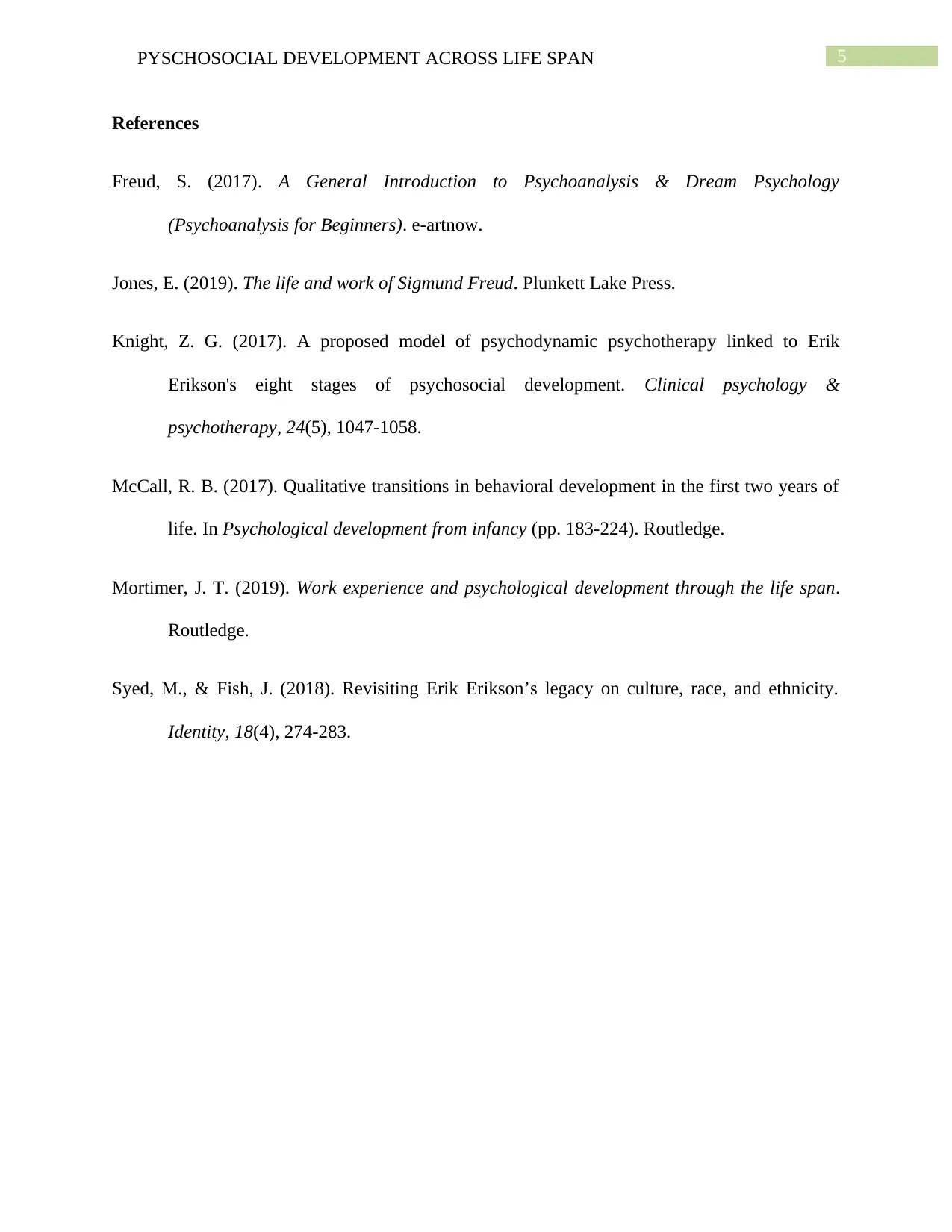
5PYSCHOSOCIAL DEVELOPMENT ACROSS LIFE SPAN
References
Freud, S. (2017). A General Introduction to Psychoanalysis & Dream Psychology
(Psychoanalysis for Beginners). e-artnow.
Jones, E. (2019). The life and work of Sigmund Freud. Plunkett Lake Press.
Knight, Z. G. (2017). A proposed model of psychodynamic psychotherapy linked to Erik
Erikson's eight stages of psychosocial development. Clinical psychology &
psychotherapy, 24(5), 1047-1058.
McCall, R. B. (2017). Qualitative transitions in behavioral development in the first two years of
life. In Psychological development from infancy (pp. 183-224). Routledge.
Mortimer, J. T. (2019). Work experience and psychological development through the life span.
Routledge.
Syed, M., & Fish, J. (2018). Revisiting Erik Erikson’s legacy on culture, race, and ethnicity.
Identity, 18(4), 274-283.
References
Freud, S. (2017). A General Introduction to Psychoanalysis & Dream Psychology
(Psychoanalysis for Beginners). e-artnow.
Jones, E. (2019). The life and work of Sigmund Freud. Plunkett Lake Press.
Knight, Z. G. (2017). A proposed model of psychodynamic psychotherapy linked to Erik
Erikson's eight stages of psychosocial development. Clinical psychology &
psychotherapy, 24(5), 1047-1058.
McCall, R. B. (2017). Qualitative transitions in behavioral development in the first two years of
life. In Psychological development from infancy (pp. 183-224). Routledge.
Mortimer, J. T. (2019). Work experience and psychological development through the life span.
Routledge.
Syed, M., & Fish, J. (2018). Revisiting Erik Erikson’s legacy on culture, race, and ethnicity.
Identity, 18(4), 274-283.
⊘ This is a preview!⊘
Do you want full access?
Subscribe today to unlock all pages.

Trusted by 1+ million students worldwide
1 out of 6
Related Documents
Your All-in-One AI-Powered Toolkit for Academic Success.
+13062052269
info@desklib.com
Available 24*7 on WhatsApp / Email
![[object Object]](/_next/static/media/star-bottom.7253800d.svg)
Unlock your academic potential
Copyright © 2020–2026 A2Z Services. All Rights Reserved. Developed and managed by ZUCOL.





